#margaret sanger
Text

In April of 1929, the Birth Control Clinical Research Bureau in Greenwich Village was raided by police. They arrested five staff members, confiscated medical records, and tried to bully patients into giving them their names and addresses.
Their tactics backfired. The Bureau and its clinic in Brooklyn received an enormous amount of publicity, and many doctors protested the violation of doctor-patient confidentiality. When the case came to court on April 19, 1929, the judge ruled that the police had exceeded the scope of the search warrant he had issued, and the case was dropped.
Above, Sanger (third from left) and the five arrested staff members after their victory: A.L. Field, Dr. Elizabeth Pissiot, Sanger, Dr. Hanna M. Stone, and Mrs. Marcella Sideri.
Photo: Bettmann Archive/Getty Images/Fine Art America
#vintage New York#1920s#Margaret Sanger#birth control#clinic raid#women's rights#birth control clinic#police raid#April 19#19 April#women's bodies#old New York City
200 notes
·
View notes
Text
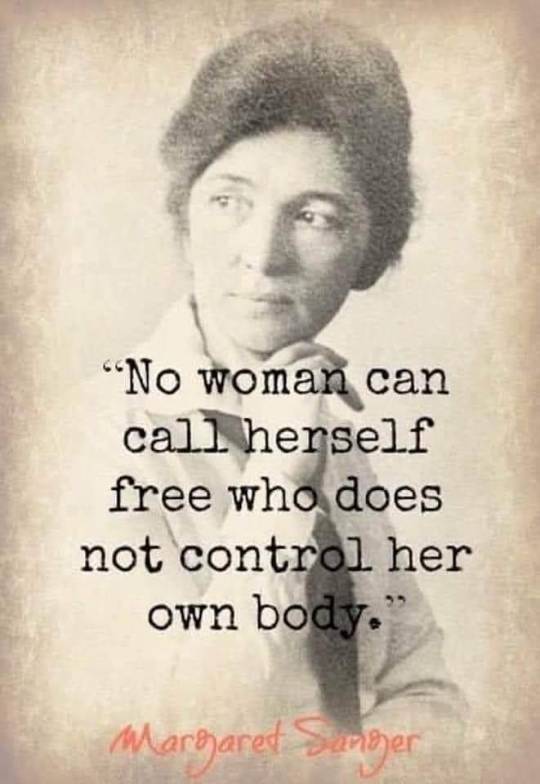
Why is medical privacy good for men, but not women? No laws legislate a man's body.
When men write the laws, women suffer.
317 notes
·
View notes
Text
youtube
Watch the American Climate Leadership Awards 2024 now: https://youtu.be/bWiW4Rp8vF0?feature=shared
The American Climate Leadership Awards 2024 broadcast recording is now available on ecoAmerica's YouTube channel for viewers to be inspired by active climate leaders. Watch to find out which finalist received the $50,000 grand prize! Hosted by Vanessa Hauc and featuring Bill McKibben and Katharine Hayhoe!
#ACLA24#ACLA24Leaders#youtube#youtube video#climate leaders#climate solutions#climate action#climate and environment#climate#climate change#climate and health#climate blog#climate justice#climate news#weather and climate#environmental news#environment#environmental awareness#environment and health#environmental#environmental issues#environmental justice#environment protection#environmental health#Youtube
4K notes
·
View notes
Text
In her book My Fight for Birth Control (1931) [Margaret Sanger] is quite clear about the fact that while birth control may have served economic ends, and while it was a practice consistent with her analysis of society, it was none the less a response to women's needs - and not to men's needs of a revolution - that induced her to take on the double task of finding out how pregnancies (and births) could be prevented, and then of distributing the knowledge to women. While today we may think that the greater problem is finding safe and satisfactory means of birth control, in Sanger's time the greater problem was providing women with the information of the means.
The law stated - in Sanger's own words - ‘that no one could give information to prevent conception to anyone for any reason’ (1931, p. 152). It was illegal to publish such information or to send such 'obscene' material through the post. Because of this 'conspiracy of silence', it is understandable that many women thought there was a ‘secret,’ known only to the privileged few. This was the case with Sadie Sacks, whose experience Margaret Sanger cites in her own account of her commitment to the struggle for birth control.
Mrs Sacks already had three young children when she became pregnant again, and because she could not afford another child, physically or financially, she procured an abortion and Margaret Sanger arrived as the nurse who afterwards battled for her life. The woman survived but was very despondent, informing Sanger that another baby would kill her (either through abortion or birth) and that she was desperate to find a way of preventing it. She asked the doctor what she should do and he treated the whole issue facetiously; he scoffed at the idea that she should want to have her cake and eat it too, and suggested that she ‘ban’ her husband to the rooftop. After the doctor's departure, Mrs Sacks implored Sanger to tell her the secret, and Sanger states with rage and frustration that she simply did not know how you prevented pregnancy.
Sanger too left Mrs Sacks's home and over the next few months felt uneasy - even guilty - about the fate of Mrs Sacks. Then she was called once more; this time Mrs Sacks died from the abortion. Sanger returned to her own home, stunned, but gradually convinced throughout the course of the night that ‘uncontrolled breeding’ was the central social problem and determined to do something about it. She writes that at that moment she renounced all palliative work for ever. ‘I would never go back again to nurse women's ailing bodies while their miseries were as vast as the stars. I was now finished with superficial cures, with doctors and nurses and social workers who were brought face to face with this overwhelming truth of women's needs and yet turned to pass on the other side. They must be made to see these facts. I resolved that women should have knowledge of contraception. They have every right to know about their own bodies … I would tell the world what was going on in the lives of these poor women. I would be heard. No matter what it should cost. I would be heard’ (ibid., p. 56).
In 1916, Sanger opened a birth control clinic in Brooklyn - the main emphasis being on contraception, not abortion - and while it was designed to provide women with information it was also a deliberate attempt to test the law. News of the clinic quickly spread, women flocked to its doors, and poured out their feelings of terror and pain on this issue which haunted their lives but which was a socially and legally taboo topic. The premises were raided, the women arrested and Sanger says, ‘We were not surprised at being arrested, but the shock and horror of it was that a woman, with a squad of five plain clothes men, conducted the raid and made the arrest. A woman - the irony of it!’ (ibid., p. 158). There can be no doubt that Sanger saw women as a group, with shared interests and a common cause. There was panic among the women in the waiting room - who were being bullied by the police in the attempt to obtain their names so that they could later be subpoenad to testify - and there was chaos outside (women, baby carriages, children - all waiting to get into the clinic). When Sanger and Tania Mindell were taken away, one woman ran after them, screaming wildly for them to come back and help her. The clinic was closed; the court declared it a ‘public nuisance’. Sanger was imprisoned but went on to fight again - and again.
-Dale Spender, Women of Ideas and What Men Have Done to Them
240 notes
·
View notes
Text
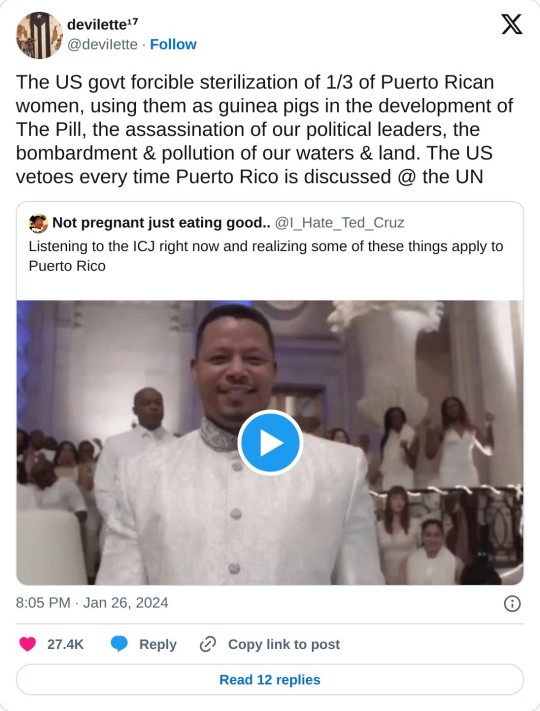
[X]
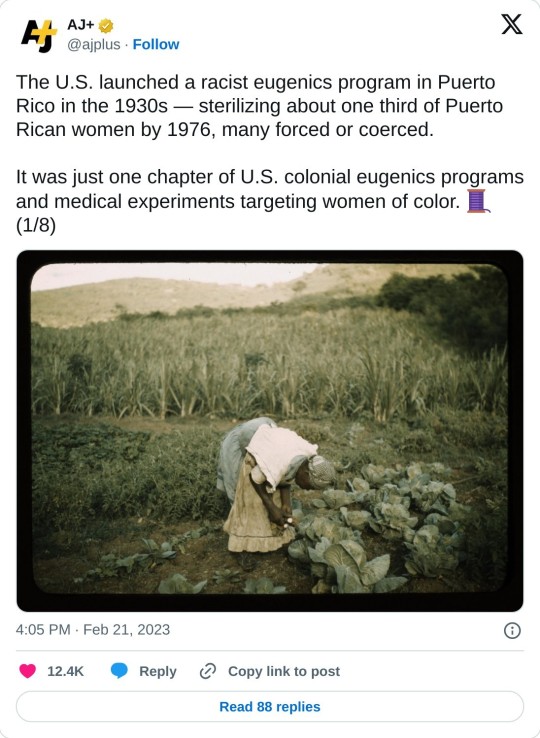

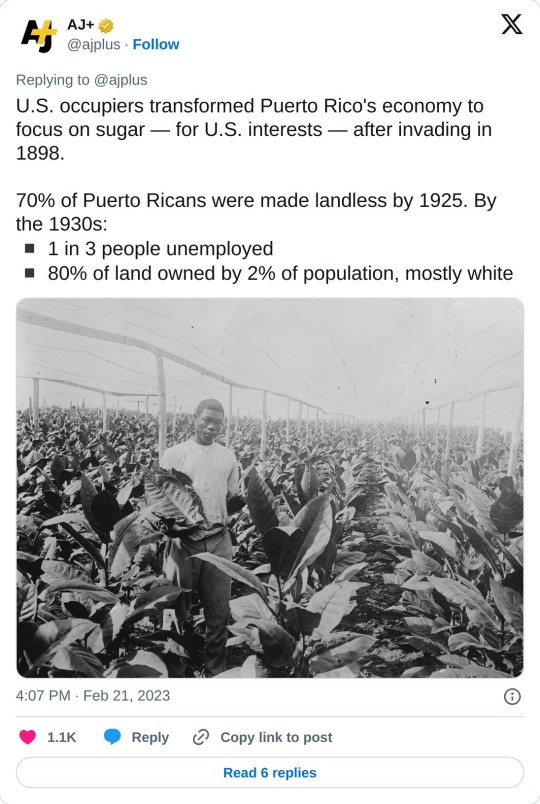


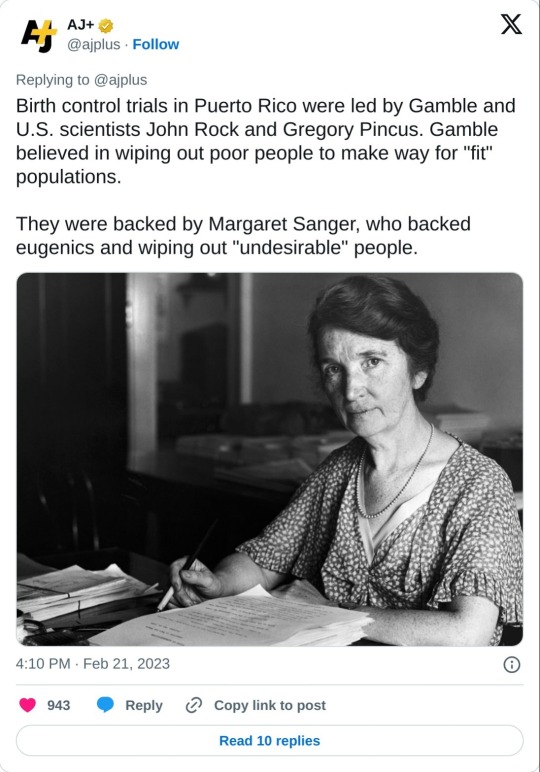
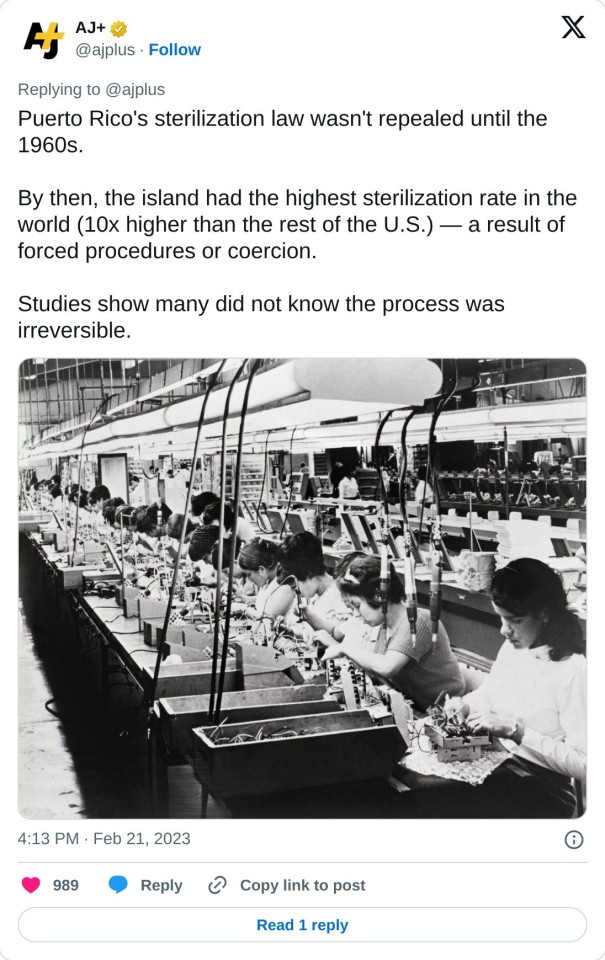

#Puerto Rico#sterilization#reproductive rights#reproductive health#reproductive justice#white feminism#margaret sanger#racism#eugenics#history#birth control#u.s. politics#Free Puerto Rico
3 notes
·
View notes
Text
Margaret Sanger: A Racist, Ableist Eugenicist
In honor of the March for Life taking place yesterday, here’s a friendly reminder that Margaret Sanger was a racist, ableist eugenicist.
In her article My Way to Peace, she outlined this 3-step plan to prevent “fifteen or twenty millions of our population” from tainting society:
Sterilizing anyone with mental or physical disabilities and putting them to work on segregated farms for the rest of their lives.
Putting poor, illiterate, drug-addicted, or sex-working individuals to work on state-run concentration farms, which they would only be allowed to leave if they reformed and accepted sterilization.
Institute mandatory birth-control training for women with serious illnesses like heart disease, to discourage them from having children.
In that same document, she specifies that she includes those “barred from entrance by the Immigration Laws of 1924” and their descendants among the undesirable groups that should be sterilized and segregated—said immigration laws barred Asians and imposed severe restrictions on the number of Africans and Arabs allowed to enter the country.
Her support for this plan actually resulted in 30 states passing laws allowing for forced sterilization: “At least 70,000 people in the United States were forcibly sterilized under the laws promoted by Sanger and her associates. Far more, especially women prisoners and women on welfare, were surreptitiously sterilized.”
She went on to say in A Better Race Through Birth Control that “women of subnormal mentality, however lacking they may be in vision and altruism, would prefer to avoid the pain and responsibilities of procreation, if the satisfaction of sex could be divorced from reproduction.”
In her article In Defense of Assassination, she said, “Exterminating warfare is also waged against the savage members of the human race wherever they oppose the establishment of conditions necessary for the development of the more highly organized types.”
In fact, Sanger’s eugenicist beliefs are so blatant that a Planned Parenthood center in NYC actually removed their founder’s name from their clinic because they didn’t want to be associated with her eugenicist policies—an ironic decision, as they continue to advocate for some of the methods of eugenics Sanger supported.
While Sanger’s ultimate mission of segregation and forced sterilization has failed, her eugenicist beliefs continue to succeed in more subtle ways. For instance, in NYC in 2013, more Black babies were aborted than born, at a rate of 67.3 per 1,000, a rate vastly higher than any other racial group. While that rate decreased to 32.6 in 2020, the disparity between races increased, with Black babies being aborted over 5 times more often than their white counterparts.
The fact that Margaret Sanger supported the forced sterilization and enslavement of POC, drug addicts, sex workers, and disabled individuals has been suppressed for decades, so as not to complicate the message that she is a champion of women’s rights. Ignoring these facts—ignoring her own words—allows these evils to continue uncontested. We cannot remain in ignorance. We cannot meaningfully separate Planned Parenthood’s current actions from their founder, especially as the racial disparities are only growing more extreme. Regardless of how you feel about abortion, it’s eugenicist roots are a vital piece of information to have when considering it.
Now that Roe v. Wade has been overturned, the March for Life has turned even more attention to mitigating the damage done by Margaret Sanger’s eugenicist beliefs. Specifically, to ensure that all pregnant women and their families have easier access to several kinds of support, so they can make a truly informed decision instead of believing that abortion is their only option.
With every woman, with every child.
#march for life#prolife#pro life#catholic#catholicism#margaret sanger#abortion#eugenics#racisim#cw forced sterilization#abelism
4 notes
·
View notes
Text
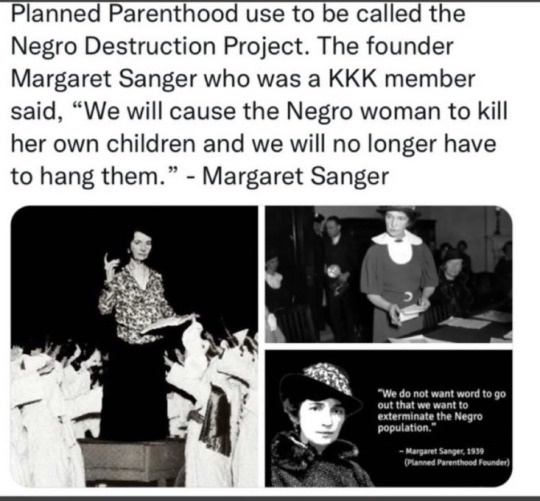
#uploads#videos#kanye west#nick cannon#planned parenthood#roe vs wade#roe vs. wade#roe versus wade#margaret sanger
87 notes
·
View notes
Text
If you see this, please say a prayer for the soul of Garrett Hardin. He wrote the address I've had to read for school about overpopulation and taking away people's "freedom to breed".
Turns out he was an avid supporter of Planned Parenthood and Margaret Sanger, was firmly against immigration, believed forced sterilization should be hoisted upon women even in America if they have more than two kids, and that large families should be heavily taxed.
He and his wife were members of a pro-eugenics group and died of apparent double-suicide in 2003.
Please, please pray for his soul and for the soul of his wife. God have mercy on them.
#Garrett Hardin#suicide#abortion#eugenics#anti immigration advocates#sterilization#forced sterilization#anti-family#Margaret Sanger#college#Tragedy of the Commons#prayer request#prayer
21 notes
·
View notes
Text
Margaret Sanger (1879-1966) Nurse, Birth Control Advocate, writer, and sex educator

On September 14, 1879, in Corning, New York, Margaret Higgins Sanger was born to Anne Purcell Higgins and Michael Hennessy Higgins. She was raised in a large Irish Catholic family and grew up witnessing the struggles of her mother, who had 18 pregnancies in 22 years. This upbringing had a profound influence on Sanger's later work as a reproductive rights activist. Despite her family's financial limitations, she pursued an education and became a nurse, working with impoverished women in New York City.
Margaret Sanger is best known for her relentless advocacy for birth control and reproductive rights. In the early 20th century, she witnessed the consequences of unplanned pregnancies, unsafe abortions, and high maternal mortality rates. This motivated her to challenge the prevailing attitudes and laws surrounding contraception. Sanger opened the first birth control clinic in the United States in 1916, which eventually led to the establishment of the organization that would become Planned Parenthood. Sanger believed that education and access to contraception were essential for empowering women and improving public health. She published numerous articles and pamphlets promoting birth control and sexual education, often facing censorship and legal challenges. Sanger also founded the magazine "The Birth Control Review" as a platform to disseminate information and foster dialogue on reproductive health. She played a significant role in challenging the laws that prohibited the dissemination and use of contraceptives. She actively sought legal battles to challenge the restrictive legislation, and her efforts contributed to the eventual legalization of birth control in the United States. Sanger's activism and lobbying efforts led to changes in public opinion, gradually shifting the discourse on reproductive health and women's rights. Her tireless advocacy for reproductive rights and access to contraception laid the foundation for the modern birth control movement. Her work challenged societal taboos and significantly contributed to the availability of contraception and family planning services, enabling women to have greater control over their reproductive choices.
Her main legacy is the organization she established, initially known as the American Birth Control League, eventually became Planned Parenthood Federation of America. Today, Planned Parenthood is one of the largest providers of reproductive health services in the United States, offering a range of medical care, education, and advocacy for women and men. Sanger's influence extended beyond the United States. She worked internationally, sharing her knowledge and promoting birth control globally. Sanger played a key role in the founding of the International Planned Parenthood Federation, which now operates in more than 170 countries, advocating for reproductive rights and providing healthcare services. Despite her significant contributions, Margaret Sanger's legacy is not without controversy. She has faced criticism for her association with eugenics, a belief system that advocated for selective breeding to improve the genetic quality of the human population. While Sanger's views on eugenics were complex and evolved over time, her involvement in the movement remains a subject of debate and scrutiny.
Margaret Sanger's legacy as a reproductive rights advocate and champion of birth control is undeniable. Her dedication to empowering women, improving public health, and challenging societal norms surrounding reproductive choices had a profound impact on the landscape of reproductive rights and access to contraception. While her association with eugenics raises important questions, Sanger's contributions to women's health and her role in establishing Planned Parenthood continue to shape the ongoing fight for reproductive justice.
For more information on Margaret Sanger:
Time log: 00:52:57
2 notes
·
View notes
Text
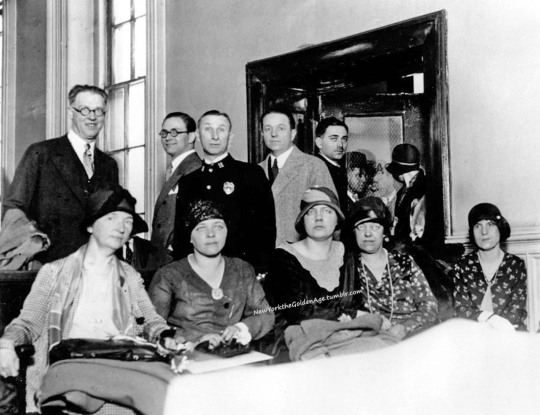
Defendants charged with maintaining a birth control clinic in violation of the law gather in the Chief Magistrate's Court, April 24, 1929. From left to right: Margaret Sanger, head of the clinic; Dr. Hannah M. Stone; Sigrid Brestwell; Antoinette Field and Marcelia Sideri. More than 500 people, including prominent physicians, supported Sanger, the founder of the birth control movement, and many gave testimony on her behalf.'
On May 14, the trial ended with a verdict for the defendants. The judge ruled, “The law is plain that if the doctor in good faith
believes that the patient is a married woman, and that her health requires prevention of conception, it is no crime to so advise and instruct therein.”
Photo: Associated Press via WHNT
#vintage New York#1920s#birth control#Margaret Sanger#People v. Sideri#Morris Ernst#sexism#contraception#April 24#24 April
121 notes
·
View notes
Text
The selection of a place for the first birth control clinic was of the greatest importance. No one could actually tell how it would be received in any neighborhood. I thought of all the possible difficulties: The indifference of women's organizations, the ignorance of the workers themselves, the resentment of social agencies, the opposition of the medical profession. Then there was the law—the law of New York State.
Section 1142 was definite. It stated that no one could give information to prevent conception to anyone for any reason. There was, however, Section 1145, which distinctly stated that physicians (only) could give advice to prevent conception for the cure or prevention of disease. I inquired about the section, and was told by two attorneys and several physicians that this clause was an exception to 1142 referring only to venereal disease. But anyway, as I was not a physician, it could not protect me. Dared I risk it?
I began to think of the doctors I knew. Several who had previously promised now refused. I wrote, telephoned, asked friends to ask other friends to help me find a woman doctor to help me demonstrate the need of a birth control clinic in New York. None could be found. No one wanted to go to jail. No one cared to test out the law. Perhaps it would have to be done without a doctor. But it had to be done; that I knew.
-Margaret Sanger, ‘My Fight For Birth Control’ in Alice S. Rossi, The Feminist Papers: From Adams to de Beauvoir
#alice rossi#margaret sanger#birth control#amerika#female oppression#male entitlement#us history#women’s history#coming to a state near you
17 notes
·
View notes
Text
youtube
Watch the American Climate Leadership Awards 2024 now: https://youtu.be/bWiW4Rp8vF0?feature=shared
The American Climate Leadership Awards 2024 broadcast recording is now available on ecoAmerica's YouTube channel for viewers to be inspired by active climate leaders. Watch to find out which finalist received the $50,000 grand prize! Hosted by Vanessa Hauc and featuring Bill McKibben and Katharine Hayhoe!
#ACLA24#ACLA24Leaders#youtube#youtube video#climate leaders#climate solutions#climate action#climate and environment#climate#climate change#climate and health#climate blog#climate justice#climate news#weather and climate#environmental news#environment#environmental awareness#environment and health#environmental#environmental issues#environmental justice#environment protection#environmental health#Youtube
4K notes
·
View notes
Photo
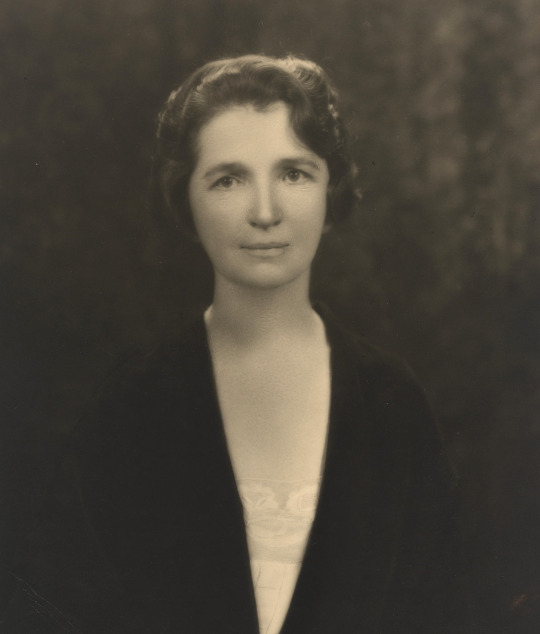
6 notes
·
View notes
Text
This seems like a great time to bring back some quotes by Margaret Sanger, founder of Planned Parenthood and patron saint of abortion, as well as quotes from her paper, The Birth Control Review!
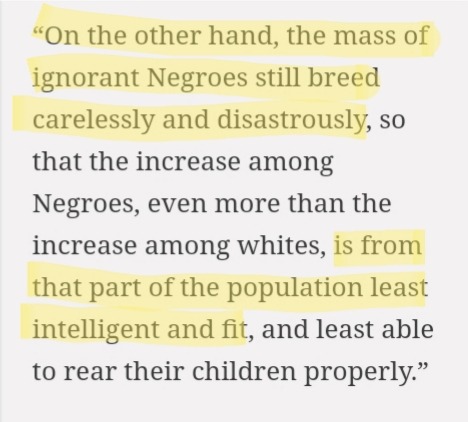

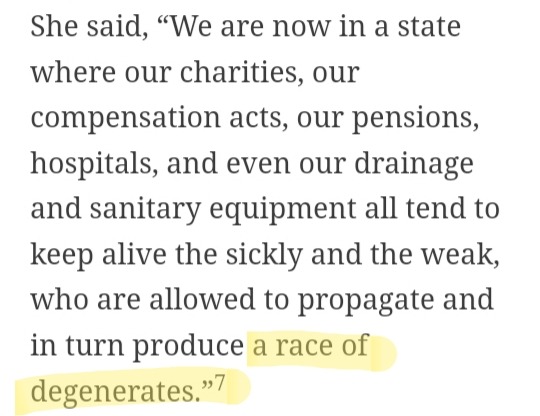
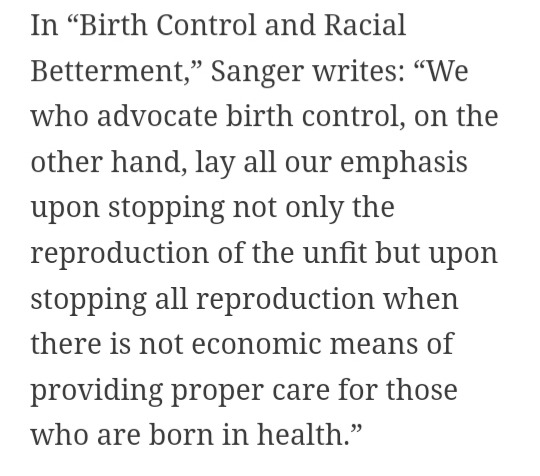

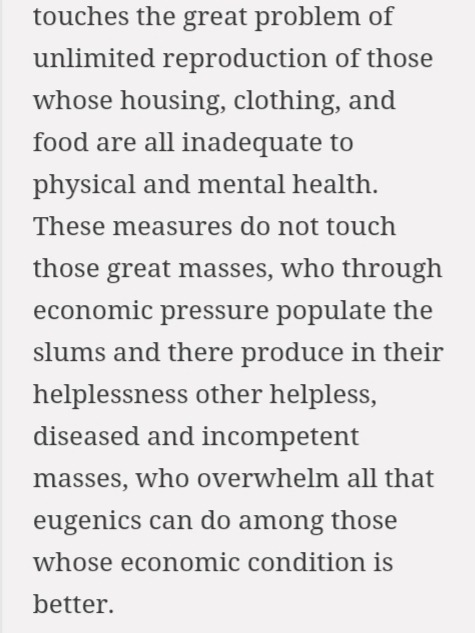
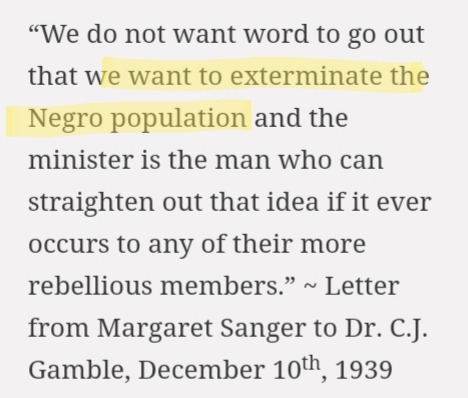
[x, x]
We give out awards named after this woman.
28 notes
·
View notes
Text
This is the woman that started Planned Parenthood. She was Hillary Clinton's mentor. She set up abortion clinics in African American neighborhoods in an attempt to decrease the black population in America. Margaret Sanger was a eugenicist who wanted a world where inferior people and races could be exterminated.


The DNC arm of the women's KKK
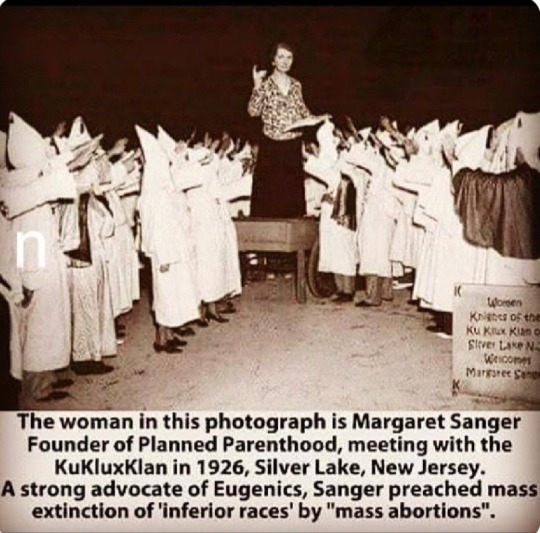
#hillary clinton#Margaret Sanger#killary#planned parenthood#planned murderhood#joe biden#Supreme Court#kkk#democrats#they hate black people
27 notes
·
View notes
Text
#uploads#videos#hebrew#Kanye west#abortion#roe vs wade#roe vs. wade#roe versus wade#margaret sanger#planned parenthood
7 notes
·
View notes
Text
Speaking for Unborn (11)
Abortion is best for society and best for unwanted babies.
Argument 47 and 48: “Every child should be wanted.” “Better for a baby to be aborted than to be unwanted, unloved, and a burden.”
First Rebuttal: It isn't an act of love or fairness or compassion to kill someone simply because they're unwanted. How can killing an unborn child—dismembering him while in the womb—ever be for his own benefit? The most uncompassionate, unkind, and unloving thing you can do to a child is to kill him.
Second Rebuttal: We need to be clear about the terms we are using here. An "unwanted pregnancy" is not the same thing as an "unwanted child." Currently, an estimated two million families are waiting to adopt children. So many of these "unwanted pregnancies" are, in fact, carrying "wanted children." Source.
Argument 49: “Better to be aborted than to end up in the unhappy foster care systems of many states.”
Rebuttal: What you are really saying is that it's better to eliminate the sufferer than to eliminate the suffering. Instead of improving foster care and the adoption process, we should just kill the child. How did killing a child become an act of kindness? Ref.
Argument 50: “It’s better to have an abortion than to bring a significantly handicapped or deformed child into the world, because their lives would be sad and limited—and they would be a terrible burden on others.”
First Rebuttal: So, you're making an argument for eugenics—improving the species and society by eliminating undesirable traits. That's a decision you might want to rethink, because it puts you in the company of groups you would never want to be associated with—like Nazis and the Ku Klux Klan. They also wanted to eliminate "inferior" people and those that might be a burden on others. And where does eugenics stop? Are we—are you—ready to eliminate those unborn, who through genetic testing, we know may have a low IQ or will likely become diabetic? All human beings have inherent dignity and it's simply not our role to decide who deserves to live or die. I think we should leave such callous and cold-hearted statements to the Nazis and the KKK.
Second Rebuttal: Abortion for deformity or severe handicap accounts for only a small minority of abortions. Nearly 95% of abortions are performed on the healthy babies of healthy mothers. So arguing for sweeping, unrestricted abortion rights based on this argument is faulty logic.
Third Rebuttal: The majority of handicapped children are happy and glad to be alive. John Merrick, the severely handicapped "Elephant Man," said it best: "I am happy every hour of the day. My life is full because I know I am loved." Did his life have so little value that he should not have been permitted to be born? He thought his life was very worthwhile. Ref.
Fourth Rebuttal: Let's be honest. When we kill a handicapped child in the womb, we really aren't doing it for his own good. We're doing it for what we perceive to be our own good. We are never protecting a child by killing her. We are only trying to protect ourselves.
Fifth Rebuttal: Do you know what group of people most disagree with this argument? People with disabilities, and their parents. Those with disabilities don't like it when people tell them that their lives are not worth living. They don't like it when people tell them that ending their lives is the most compassionate thing someone could do for them. They and their parents would tell you that that's the least compassionate act they could ever imagine. Ref.
Argument 51: “Abortion is best for society because it helps decrease unwed birth rates, child abuse, and crime.”
Rebuttal: This is simply untrue. Legalizing abortion has done nothing to reduce unwed births, child abuse, or crime. To the contrary, all have significantly increased since Roe. For example, The National Center on Child Abuse and Neglect has demonstrated that child abuse and neglect have increased over 1,000% since Roe. Unwed births for black children have skyrocketed to 73%. So if decreasing rates of unwed births, child abuse, and crime are your arguments for abortion, you might want to reconsider your position. Source1. Source2.
Argument 52: “Restricting abortion is unfair to the poor and minorities, who need it most.”
First Rebuttal: Let's be clear: abortion advocates are not worried about helping the poor or minorities, but they are happy to help them abort their children. In fact, Planned Parenthood, the most prolific killer of the unborn, places the majority of its abortion centers in minority neighborhoods. And its founder, Margaret Sanger, was an outspoken racist who wanted to eliminate “indiscriminate breeding" by minorities, whom she considered "human weeds." And her plan has worked remarkably well: abortion is now the number-one killer of black lives in America-more than heart disease, cancer, and gun violence combined. Source.
Second Rebuttal: Let me tell you about Planned Parenthood and minorities: Planned Parenthood was founded by a proud racist, Margaret Sanger, who wanted to eliminate "indiscriminate breeding" by minorities, whom she called "human weeds." Her goal was to decrease the black and minority populations, and she actually advocated for the killing of babies. As she famously said in 1920, "The most merciful thing that the large family does to one of its infant members is to kill it." Planned Parenthood has faithfully pursued Sanger's dreams, as the majority of babies now being disposed of are poor and dark skinned. That's Planned Parenthood. Source.
Argument 53: “Abortion is an important method of population control in our overcrowded world.”
Rebuttal: Even if we agreed that we have an overpopulation problem, killing off a segment of the population would never be an acceptable solution. Solutions based on killing innocent human beings are never OK.
Credit.
#speaking for the unborn#rebuttals#racism#unwanted#ableism#foster care#adoption#eugenics#nazis#kkk#child abuse#lowering crime#crime#handicapped#burden#poor#minorities#Margaret Sanger#planned parenthood#pp#population control#prolife#pro life#pro-life#abortion#anti-abortion#prochoice arguments#prolife rebuttals
11 notes
·
View notes
